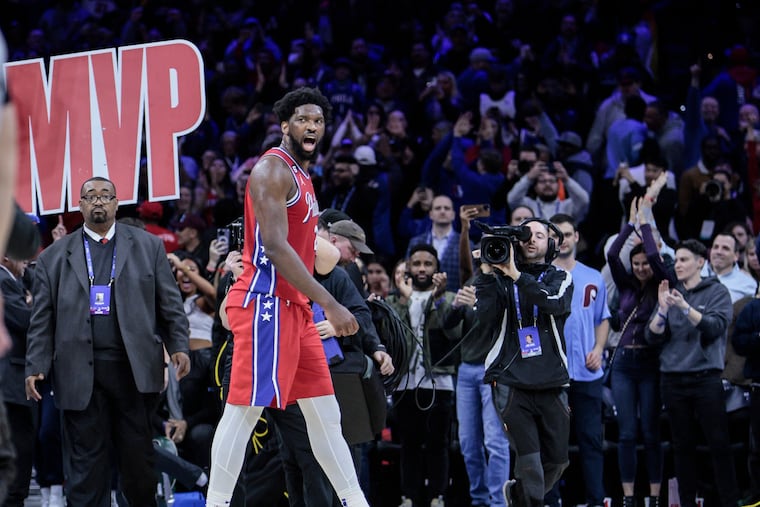Joel Embiid just ended the MVP conversation by sitting against Nikola Jokic. And that’s fine.
Embiid’s best chance to prove himself was to do it head-to-head. But while the MVP conversation is basically over, this is an indication that his priority is his team's looming postseason.

Let’s make one thing clear: None of what you are about to read is meant to suggest that Joel Embiid just sacrificed himself in order to save mankind with his decision to sit one out against Nikola Jokić and the Denver Nuggets on Monday night.
That said, we should at least offer the big man a nod of appreciation for ending this year’s NBA MVP debate before it could completely destroy polite society. The real heroes are the consensus builders, and Embiid has somehow found a way to leave everybody better off. He and the Sixers get a chance to focus on the postseason. Everybody else gets a brain that is no longer soup.
» READ MORE: How the Sixers’ Joel Embiid debunks George Karl’s ‘lazy’ label and makes his MVP case
That first part is what matters.
It would be easy to look at Embiid’s absence on Monday night as a form of capitulation. That’s certainly how Nuggets fans viewed it. After the news broke that Embiid would not be suiting up against his chief rival for this year’s MVP trophy, somebody in Denver printed up fake Missing Person posters and distributed them throughout Ball Arena.
And, hey, they have a point. The strongest argument for Jokic over Embiid has always been the latter’s spotty availability. Is that fair? Well, that depends on how you define MVP. But it seems to matter to voters. Only once in NBA history has a player won the MVP while playing 68 or fewer games in an 82-game season. That was Bill Walton back in 1977-78. Embiid has never played more than 68 games, and he almost certainly won’t this season.
In that sense, Monday night’s game against the Nuggets was a gift from the schedule-makers. The strongest argument for Embiid over Jokic is that when you see them on the same court, there’s no question who has more of an impact. Embiid had already dominated Jokic once this season, scoring 47 points and grabbing 18 rebounds in a 126-119 Sixers win over the Nuggets in January. This was Embiid’s chance to remind voters that, regardless of Jokić’s gaudy stat line, Embiid is the big man you most want on your side if your objective is winning a basketball game. Instead, Jokić turned in a triple double, the Sixers lost their fourth out of five, and Embiid watched it all from the sidelines.
You can argue that none of that should matter. Embiid’s statistical case for MVP is stronger than it ever has been. His scoring average of 33.3 points per game isn’t just the best in the NBA this season. It’s historic. Only 10 players have ever reached that threshold. Only three have done it in the last 35 years: James Harden, Kobe Bryant, and Michael Jordan. It’s also 8.4 points higher than Jokic’s average, a big enough gap that you can almost excuse Jokić’s 5.8 more assists per game. After factoring in the eye test, and the huge edge that Embiid’s defensive impact provides, Jokić’s MVP resume relies mostly on semantics. That is, defining “value” as whatever it is that Jokić provides with his unprecedented stat line.
Of course, the MVP is first and foremost a semantic award, and MVP voters have already decided that a season like Jokić’s is more worthy of the name than a season like Embiid’s. Anybody who considered Jokić the MVP of the last two seasons will be hard-pressed to decide otherwise this year. His numbers are the same, his efficiency is better, and his team has the best record in the Western Conference.
Embiid is the player I’d want on my team in a seven-game series, and it isn’t particularly close. But, whatever, they are both great players. Differentiating between the two when picking MVP depends mostly on how you define the award.
But, again, none of this really matters.
You can argue that Embiid’s fixation on the MVP rings hollow if he can’t even bring himself to suit up against the one guy who stands in his way. But the more you think about it, the more you should realize that it is a feather in his cap. It’s an indication that, for all Embiid’s talk about individual recognition, his priority remains his team’s looming postseason run.
» READ MORE: The Sixers will likely need to go through both the Celtics and Bucks for a different playoff ending
With the No. 1 seed now a virtual impossibility, the Sixers have much more to gain over the next couple of weeks with Embiid off the court than with him on it. In an ideal world, Embiid will spend the rest of the regular season preparing his body to withstand the rigor of back-to-back playoff series against Boston and Milwaukee. That’s much better than him spending that time in pursuit of an individual award.
At the end of the day, history will judge Embiid on his ability to get his team off the plateau where they’ve been stranded for the last five years. If he really is the best player in the NBA, or the most valuable, or the most outstanding, or however you want to define it, then his presence should give his team an inherent postseason edge.
There’s a very good chance that the Sixers’ postseason fate will end up hinging on Embiid’s ability to dominate the proceedings. His current priority should be preparing himself for that eventuality. After all, the only correct MVP take is that it isn’t what matters.